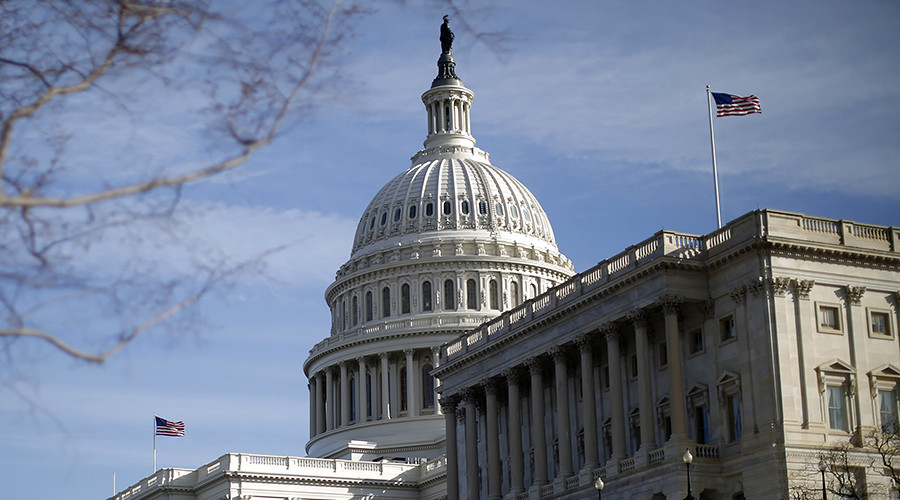‘Terribly bad mistake’: US Senator says Russia sanctions go against EU energy security & free trade

The essence of the new anti-Russian sanctions awaiting Donald Trump’s approval is to block the joint EU-Russian Nordstream II pipeline project and to tie Trump’s hands in building trade relationship with Moscow, Virginia State Senator Richard Black told RT.
Black said he believes that in pushing for Russia sanctions, Congress is attempting to use a political tool to gain economic advantage. He notes, however, that President Donald Trump at the same time came under harsh criticism for applying his “America First” principle to address trade imbalances with other countries.
“Here he [Trump] is trying to have free trade with Russia, he is trying to reset the relationship with Russia – and the Congress itself has made a major move to block free trade and interfere with the market,” Black said.
As the House of Representatives voted overwhelmingly to pass the legislation, it would be pointless for Trump to veto the bill now, when it can be easily overridden, Black said, adding that despite the unity among lawmakers the sanctions were “not quite a done deal, because there is tremendous backlash from the European Union.”
“There is a possibility that the EU backlash will cause the House and the Senate perhaps to make some modifications,” he argued.
Speaking about EU’s ability to take concerted action against Washington in response to the sanctions that affect joint energy projects with Russia, Black said that he doubts it would be possible for all 28 members of the bloc to agree on the issue.
The legislation itself, even if signed into law by President Trump, does not oblige him to target Nordstream II with punitive measures, as it merely gives the US leader the leverage to do so, Black said, arguing that by leaving a loophole to Trump the lawmakers wanted to shift responsibility for the measure, unpopular with the EU.
Black argued that by leaving the final word to the president, the Congress is literally saying that what it is doing is “so extraordinary extreme” that “we are a little bit uncomfortable just doing it, let’s give it to the president.”
Being provided with such an opportunity, Trump, however, may end up not pressing the button, the senator believes.
“I seriously doubt that President Trump as long as he allowed the discretion, I don’t think he is going to introduce sanctions on Nordstream II because it’s really a security for Europe,” Black said, noting that, for its part, the EU might go to great lengths to not let the project stall.
“My guess is that the EU would to do everything to ram through the Nordstream II gas pipeline and I believe that they should, as it will provide stability, safety for the people of Europe,” he said, calling the US lawmakers’ intent to dictate energy policy over the US a “terribly, terribly bad mistake” which “reflects some poor leadership on the part of the House and the Senate.”
The bill, which targets Russia’s energy sector, banks, weapons manufacturers as well as individuals, was envisioned as a response to Russia’s support of the Syrian government in its fight against Islamic State (IS, formerly ISIS, ISIL), Crimea’s reunification with Russia and alleged support of eastern Ukrainian rebels.
The legislation also does not spare the joint energy projects between Europe and Russia, which has led to several European countries and the EU officials expressing concerns over its implications to European businesses and its energy security.
President of the European Commission, Jean-Claude Juncker, warned Washington that the EU was “ready to act appropriately within a matter of days,” accusing the US authorities of neglecting Europe’s opinion on the issue.
Germany and France also condemned the unilateral move on behalf of the US, with Berlin saying that “it is not in the Americans’ right to judge or stipulate which way European companies may engage in cooperation with any third parties” and Paris pointing that sanctions “contradict international law” due to its outreach.
‘EU may work around sanctions & come into conflict with US’
Political historian Mark Shanahan, who lectures in Politics and International Relations at the University of Reading, believes that on the one hand, the new sanctions reflect the House lobby “pushing hard at the American fuel agenda,” and on the other hand represent a political struggle involving Trump and the GOP.
“This is about putting the President [Trump] back in his box. It is a fight between the GOP, the Republicans in Congress, and the executive branch in the White House. At the moment, the President is not in a very strong place – he could almost certainly not see his veto carried through on this bill, and may end up in a very, very weak position,” Shanahan told RT.
This could, however, turn into a conflict between the US and the EU, as the sanctions go against the interests of many European states.
“The EU is very, very strong trading body in its own rights. It may choose to work round the American sanctions and deal directly, particularly on energy with Russia. That will bring them into conflict with the US, and that hasn’t happened for quite a long time at this scale and at this level. But it may be a case of having to,” Shanahan said.




0 Comments:
Post a Comment
Subscribe to Post Comments [Atom]
<< Home